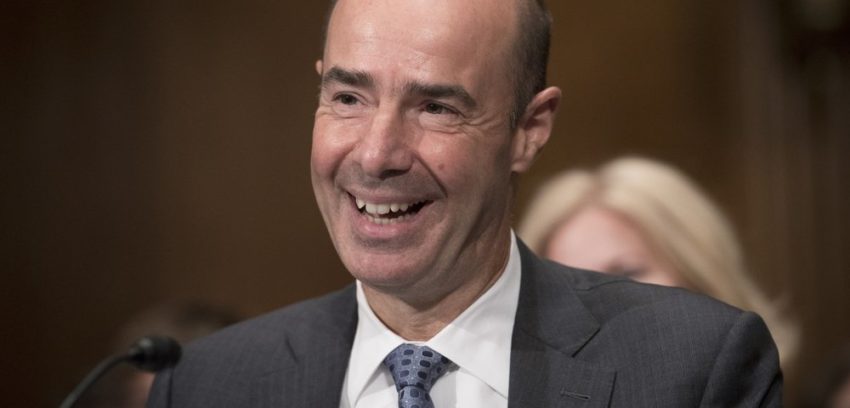Secretary of Labor nominee Eugene Scalia speaks during his nomination hearing on Capitol Hill, in Washington, Thursday, Sept. 19, 2019. (AP Photo/Cliff Owen)
With Trump Labor Secretary nominee Eugene Scalia set for a Senate confirmation vote on Tuesday, a previously unreported 1997 op-ed by Scalia fits a disturbing pattern of dismissive views towards workplace sexual harassment that has emerged through writings and records from his legal career.
In December 1997, Scalia penned an op-ed entitled “All kinds of sexual harassment on trial” in the Washington Times, where he argued that civil rights laws could not be used to shield victims from workplace sexual harassment.
In his argument, Scalia conjured his own highly descriptive example of two twin 16 year old brothers, both working the same summer job. One brother — H — was called “fag,” “queer” and another — J — was called “fat-boy” on the job. Scalia went as far as describing a scenario where one of the boys was threatened with rape on the job by his supervisor.
“‘J. Doe’ was overweight – the crew took to calling him ‘fat-boy.’ ‘H. Doe’ wore an earring – the crew dubbed him ‘fag’ and ‘queer’…,” Scalia said. “One member of the crew -Dawe, ‘a former Marine of imposing stature’ – allegedly alternated between urging H to ‘go back to San Francisco’ and offering to take him ‘out to the woods’ and ‘get him up the –.’”
Scalia asserted that because one boy was called fat, and one boy was targeted for his sexuality — the same boy that was threatened with rape by a male supervisor — the abuse lacked sexual motive and could not be protected by civil rights laws. “The plain implication is that the motive for Dawe’s harassment was not ‘sexuality, ‘ but that Dawe was a bully and H and J were young and vulnerable. Each boy had a distinguishing feature, H’s earring and J’s weight.,” Scalia said. “That became the focus of the abuse, but it was not the motive.”
The following year, in 1998, in an op-ed published in the Harvard Journal of Law and Public Policy, Scalia argued that an employer was only responsible for harassment if it “endorsed the conduct.”
More than a decade later, Scalia was in the courtroom, berating alleged victims of workplace sexual harassment, coloring an ominous pattern for the potential nominee to head Trump’s Labor Department.
In 2015, HSBC Bank USA hired Scalia as the lead attorney in a suit involving the sexual harassment of a former employee of the organization, a young analyst anonymously dubbed “Jill.”
Allegedly, Jill was utilized by her boss at social events after work hours as flypaper to attract executives and reel-in business. When Jill started routinely breaking down in tears at her desk, a coworker nearby, Mike Picarella, elevated the events to HR.
According to witnesses of the events, immediately upon the deposition’s opening, instead of questioning the veracity of the victim’s claims, Scalia attacked her mental capability. Critics called Scalia’s tactics a mixture of victim shaming and blaming.
Scalia asked Jill if she was on depression and anxiety medication, and questioned where she was receiving medical treatment.
Scalia was described as probing Jill’s sexual and romantic relationships, whether she had been promiscuous before and insinuated that other members of the office might have nude photographs of her. Scalia was described as growing “belligerent” towards Jill.
As the victim began to break down in tears, Scalia forced Jill to recount the details of her harassment in vivid detail.
“I couldn’t believe Scalia was asking questions like how she was sexually harassed,’ Picarella said. “She was crying the whole time”
An attorney in the room described Scalia’s line of questioning as a tactic of contortion to blame the alleged victim. “You’re just twisting at windmills and you’ve got a third-party witness here who has no involvement in these events that you’re talking about,’ Jill’s Attorney Jim Hubbard said.
As the hearing progressed, Scalia’s motives became clear: to discredit Jill in any way possible in order to shield his client — a corporate banking giant — from rendering further payments to the victim of sexual harassment. “And the goal was obvious — to depict Jill as a slut and effectively dismiss her claims,” said investigative journalist David Dayen.
Scalia’s confirmation vote is set for this coming Tuesday. It is unlikely that the Republican-occupied senate — led by Majority Leader Mitch McConnell — will budge in regards to the resurfaced allegations against Scalia. It is unlikely, though, considering their inability to turn away from almost any of President Trump’s nominees, as in the case of their nomination of credibly accused sexual harassment perpetrator — and now Supreme Court Justice — Brett Kavanaugh in 2018.

